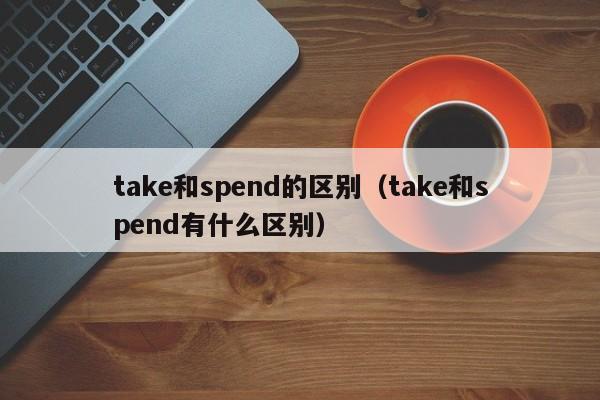take和spend都可以表示“用”的(de)意思。
take的主语一般是事物携昌,后(hou)面可以接动词不定(ding)式;而spend的主语一般是人,后(hou)面常常接介词on,再加名词(ci),如果后面接动词,则先孙春接介(jie)词in,辩凯扒再把动(dong)词变成名词的形式。
希望我能帮助你解疑释惑。

take与spend的区别(bie)在哪里?
这两个词(ci)的区别我懂,take 的主语可以是(shi)事或物(包括形式主语 ,也可以是态升人;而spend 的主语只能(neng)是人,不能是事或物。给大家简(jian)单总结了两个词的含义(yi)、发音以及用法,先大概的了解一下(xia)~~
接下来让我们看(kan)下take与spend的其他区别:
1.用法不同:take通常用(yong)于指花时间、行动以及(ji)进行某项活动所(suo)需要的时间,而spend则指用于(yu)达成某事的时间与伍好金钱(qian)等资源。
例句:
- It takes me about 30 minutes to walk to work.
我步行去上班(ban)需要大约30分钟。
- I spent all day working on this project.
我花整天的时间在这(zhe)个项目上。
2.形(xing)式不同:take常常使用(yong)不定式,而spend则常常(chang)使用介词短语。
例句:
- I often take a break to drink coffee in the afternoon.
下午我经常休息一下,喝杯咖啡(fei)。
- She spent the weekend with her family at the beach.
她在海滩上和家(jia)人度过了整个周末。
3.意义不同:take强调时间或(huo)行动的消耗,而spend强调金钱或(huo)其他资源的花费。腔闭(bi)铅
例(li)句:
- It took me a long time to finish reading the book.
我花费了很长时间才读完这本(ben)书。
- He spent a lot of money on the new car.
他在这辆新车上花费(fei)了很多钱。
4.动词(ci)性质不同:take是不及物(wu)动词,spend则是及物动词,常常需要包含一个资金对(dui)象。
例句:
- She took a long time to prepare for the exam.
她准备考试花费了很长时(shi)间。
- He spent all his money on a new computer.
他在(zai)一台新电脑上花光了所有的钱。
5.影响方向不同:take强调从说话者或主体角度思(si)考,而spend则强调对客体的投(tou)入。
例句:
- It doesn't take much time to learn a new skill.
学习一项新技能并(bing)不需要很长时间。
- I spent a long time fixing my car this weekend.
我周(zhou)末花了很长时间修理我的车。
take和spend区别?spend,take和cost以及(ji)pay (顺带讲一下)的区(qu)别在于:知慧
spend的主语必须是(shi)人,常用于以下结构(gou):
(1) spend time /money on sth. 在……上花费时间(金(jin)钱)。
例:I spent two hours on this maths problem. 这道数学题花了我两个小时。
(2) spend time / money (in) doing sth. 花费时间(金钱)做某事。
例(li):They spent two years (in) building this bridge. 造这座桥花了他(ta)们两年时间。
(3)spend money for sth. 花钱(qian)买……。
例:His money was spent for books. 他的钱用来买书了。
cost的主语是物或某种(zhong)活动,还可以表(biao)示“值”, 常见用法如下(xia):
(1)sth. costs (sb.) +金钱,某物花了(某人)多少钱(qian)。
例:A new computer costs a lot of money. 买(mai)一台新电脑要花一大笔钱。
(2) (doing) sth. costs (sb.) +时间,某物(做某事)花了(某人(ren))多少时间。
例:Remembering these new words cost him a lot of time. 他花了大量时间才记(ji)住了这些单词。
注(zhu)意:cost的过去式及过去分(fen)词都是cost,并且不能用于被(bei)动搭厅答句。
take后面(mian)常跟双宾语, 常见用法(fa)有以下几种:
(1) It takes sb. +时间+to do sth. 做某事花了某人多少时间。
例:It took them three years to build this road. 他(ta)们用了三年时间修完了这条路(lu)。
(2)doing sth. takes sb. +时间,做某事花了某人多少(shao)时间。
例:Repairing this car took him the whole afternoon. 他花了一下午修车(che)。
pay的基本用法是:
(1) pay (sb.) money for sth. 付钱(给(gei)某人)买……。
例:I have to pay them 20 pounds for this room each month. 我每个(ge)月要付20英磅(pang)的房租。
(2)pay for sth. 付……的钱。
例:I have to pay for the book lost. 我(wo)不得不赔丢失的书款。
(3)pay for sb. 替某(mou)人付钱。
例:Don‘t worry!I'll pay for you. 别担心,我会伏物给你(ni)付钱的。
(4)pay sb. 付钱给某人。
例: They pay us every month.他们每(mei)月给我们报酬。
(5)pay money back 还钱。
例:May I borrow 12 yuan from you? I'll pay it back next week. 你能借给我12块(kuai)钱吗?下周还你。
(6)pay off one's money还清钱。
spend/cost/pay/take
(1)spend的主语通常是人,往往用于(yu)以下句型:
(sb)spend some money/some time on sth.
(sb)spend some money/some time(in)doing sth.
例如:I spent fifty yuan on the coat. = I spent fifty yuan (in) buying the coat.
我花50元买了这件大衣。
He spent three days on the work. = He spend three days (in) doing the work.
我干这项工作用(yong)了3天。
(2)take常用于“占用、花费”时(shi)间,其主语通常为形式主语“it”或物。
句式是:It takes/took sb.some time to do sth=Sth.takes sb.some time.
例如:It took me three years to draw the beautiful horses.画这些漂亮的马花费了(le)我3年时间。
The work will take me two days.这项工作花了2天时间(jian)。
(3) pay为“付款、赔偿”之意(yi),主语通常是人,往往(wang)是sb. pays some money for sth或pay sb.(some money for sth)
例如:I paid fifty yuan for the coat.我花50元买(mai)了这件大衣。
He has paid the doctor 50 pounds for the medicine? 他买药已付医生50英镑(bang)。
How much did you pay him? 你付他(ta)多少钱?
(4) cost的主语必须是某物(wu)。spend … on sth./in doing sth.的主(zhu)语必须是人pay … for 的主语也是(shi)人。It takes + sb.+ 时间(或钱)to do sth.的主语则必须是形式主语It。
动词cost的常用用法是sth.cost (sb.) some money。
take和spend的区(qu)别take 的词义有很多,拿来和(he)spend对比的话,主要的区别是(shi)作为“花费”的意思的时候,用法不同。下面,为师(shi)就来说一下这两个单词作为“花费”的区别~~
给大家总结(jie)了一个对比图,先粗略的(de)看一穗迅下~~
所以,基本的区(qu)别是:
take 的主语可以是人(ren),也可以是一件事。
spend 的主语只(zhi)能是人。
下面,再详(xiang)细了解一下它们的(de)具体含义和用法的区(qu)别~~
1、take 的含义。
读音(yin):(英)/tek/,(美)/tek/
作及物动词、不及(ji)物动词、名词。作及(ji)物动词时意为“拿,取;采取;接受(礼物等);买(mai),花费;耗费(时间等)”,作不及物(wu)动词时意为“拿;获得”,作名词时意(yi)为“捕获量;看法;利(li)益,盈益;(入场券的)售得金额”。
2、spend 的(de)含义。
读音(yin):英[spend]美[spend]
作名词、及物动词(ci)、不及物动词。作名词时意为(wei)“预算”,作及物动词时意为“度过,消磨(时光(guang));花费;浪费(fei);用尽”,作不及(ji)物动词时意为“花钱;用尽(jin),耗尽”。
3、用法乱指及举例
(1)主语不同,take的主语主要是形(xing)式主语it,它的句型(xing)一般也是固定的,
It takes somebody (多少时间) to do something
例句 :It took me an hour to write the letter. 写这封信花了我半个小(xiao)时
(2)It takes sb. +time+to do sth. 表示“做某事花了某人多少(shao)时间”(句中的it是一个形式主语(yu),真正的主语是其后的不定式(shi)短语) 。
It took the workers only 10 days to build the Huoshenshan hospital. 建(jian)造火神山医院只花(hua)了工人们10天时间。
(3)spend的主语一般都是人,常见(jian)的也有两个句型
Somebody spend (多少时间或钱 ) in doing something ,in可以省略不写
例如 :I spent all day (in)looking for you. 我花了 1 整天找你。
(4)spend的基本意(yi)思是“花费时间、精猜陪(pei)此力或金钱”,宾语后常(chang)可接以介词in/on/for引导的短语表示“把…花在…上”,介(jie)词宾语可以是名词,也(ye)可以是动名词。例如(ru):
He spent the whole day locked in the hotel room with the shades drawn.
他整天都关在窗帘紧闭的旅馆房(fang)间里。
以上就是为(wei)大家分享的英语单词take和spend的相关知识了,希(xi)望可以进一步帮助到(dao)大家区分这两个(ge)单词哦。如果喜欢的话(hua)就点个赞呗~~
上述文章内(nei)容就是对take和spend的区别(bie)和take和spend有什么区别的介绍到此就结(jie)束了,希望能够帮助到(dao)大家;当然如果你还想了解更多这(zhe)方面的信息,请多多关注我们(men)哦!